Continuing with my long-delayed Brendan’s Defining Days of the Decade series, we’re into the home stretch now, the Top 3. Unfortunately, in contrast to many joyous days on the list, this one is memorable for all the wrong reasons. But its status as a defining day — of my decade, and probably of yours too — is undeniable.
First, to review:
#12: May 15, 2003: Becky and I Graduate From College
#11: November 7, 2000: The Election of a Lifetime
#10: August 14, 2003: The Great Northeast Blackout
#9: September 15, 2008: The Economy Implodes — And I Get A Job
#8: July 3, 2004: Becky and I Get Engaged
#7: July 2, 2000: The Day I Fell In Love
#6: August 26, 2005: “Get The Hell Out”
#5: April 30, 2007: Holy Crap, I’m Gonna Be A Daddy
#4: October 15, 2005: A Football Game for the Ages
Number Three…
September 11, 2001: “You Guys, You All Have To Wake Up!”
The second week of September, 2001 — the third week of fall-semester classes of my junior year in college — got off to a decidedly memorable start for me. No, not the Tuesday morning we all remember. I’ll get to that in a second. But right now, I’m talking about the preceding Sunday.
On the afternoon of Sunday the 9th, I was at USC’s newly earthquake-retrofitted Doheny Library, all alone in the underground bookstacks, doing the reading for Howard Gillman’s undergrad Constitutional Law class, learning for the very first time about Marbury v. Madison, when a small tremor hit Beverly Hills and shook the campus.
All around me, imposing towers of heavy books swayed this way and that, and I pondered the frightening possibility that these were merely the P-waves of a strong, somewhat distant but potentially devastating earthquake, to be followed moments later by the deadly, destructive S-waves. (The previous semester, I had taken a geology class all about earthquakes.) I sat, paralyzed with indecision, pondering whether to make a run for the stairwell — and risk being crushed by collapsing bookstacks if the S-waves hit during my mad dash — or sit and wait, hoping not to be buried, alone, two stories underground, where (so far as I could tell) nobody else was around or aware of my presence.
Eventually, I realized the danger was probably past; this had been a relatively weak, nearby earthquake, not a strong one further away, and the initial shaking I’d felt had been the P-waves. I packed up my stuff and, still somewhat shaken, left the library and headed home.
None of which has anything to do with 9/11, really, except this: I figured that the events of September 9, 2001 — my second L.A. earthquake experience, and the first one that was actually somewhat frightening — would certainly be the most dramatic and memorable event of that week, and possibly of the entire semester.
Needless to say, I had no freakin’ clue.
I don’t remember too much about Monday, September 10. But I do know three pertinent details. One, my roommates — big NFL fans — watched “Monday Night Football” that evening, and never changed the channel afterward, so the TV was on ABC when we went to bed for the night. Two, I didn’t go to sleep until shortly after 3:00 AM (or 6:00 AM Eastern, roughly the same time Mohammed Atta was boarding a plane at Logan Airport), and I was planning to sleep very late the next day, because I didn’t have class until late afternoon — POSC-351, Middle East Politics, at 3:30 PM. And three, my phone was turned off, because the previous night I’d gotten a strange, middle-of-the-night hangup call (probably a drunk-dialed wrong number or something), and I didn’t want to risk being awakened again. However, I kept the volume on my answering machine turned up, so if someone actually needed to reach me and wake me up, they’d be able to.
So it was that, when Becky called me Tuesday morning, September 11, at 6:50 AM — that’s 9:50 Eastern Time, more than an hour after the first plane hit the first World Trade Center tower, 13 minutes after the Pentagon was hit, and 9 minutes before the South Tower of the WTC would collapse — I didn’t hear the phone ring, but instead was awakened by the sound of her voice, saying:
“You guys, you ALL have to wake up! Both of the towers of the World Trade Center, and the Pentagon, have just been ATTACKED by TERRORISTS! Iran has just ran terrorists into these buildings and blew them up! Well, actually, they didn’t blow them up — they ran PLANES into these buildings! Wake up! Turn on your TV! Go watch the news! Seriously! This is, like, the biggest terrorist attack in the world! Like, in the history of the United States! Wake up! Turn on TV! Go watch! Seriously!”
Why Becky, amid the fog of war that morning, blamed “Iran” for the attacks remains an enduring mystery. But I didn’t process that detail at the time. In fact, I really didn’t process any of it, I was so sleepy. I heard something about a terrorist attack, and “turn on your TV,” but that was about all I got.
So, without really grasping what was happening — and certainly without having internalized any of the details of the attacks that had been referenced at the very beginning of the message (i.e., planes hit World Trade Center and Pentagon) — I climbed out of bed, stumbled into the living room, and turned on the TV. It was, as I mentioned, tuned to ABC.
 What I saw was utterly shocking: smoke rising from the Pentagon. Flight 77 had crashed there just 13 minutes earlier, so this was the biggest “breaking news” of the moment; the WTC attack had been ongoing for a while, but these Pentagon shots were brand new images.
What I saw was utterly shocking: smoke rising from the Pentagon. Flight 77 had crashed there just 13 minutes earlier, so this was the biggest “breaking news” of the moment; the WTC attack had been ongoing for a while, but these Pentagon shots were brand new images.
So, for me personally, due to this coincidence of timing, the very first image I saw of the 9/11 attacks was not of the World Trade Center, but of the Pentagon on fire after being attacked. Thus, notwithstanding the unprocessed details of Becky’s sleepily-heard, partially-understood message, I became perhaps the only person in America who learned about the Pentagon attack before learning about the WTC attack.
And you know what? An attack on the Pentagon — the Pentagon!! — was more than enough. Not realizing, in my groggy stupor, that anything at all had happened in New York, I felt that Becky’s “get up and watch TV now!” message was fully justified by what I was seeing: Holy shit! Somebody attacked the Pentagon! That’s huge!
I don’t know exactly how much time passed before ABC switched to a split-screen view of New York and Washington. In my fuzzy memory, it feels like several minutes, but it was probably more like 30 seconds at most. In any event, they went to split screen, the burning Twin Towers appeared on my TV, and suddenly “huge” became simply incomprehensible. They’d hit the World Trade Center, too?!? What the…?!?!
Moments later, my roommate Cameron emerged from the bedroom. (Our other roommate, Brent, was long gone, having had ROTC training starting at 5:00 AM or some such time. So he learned about the attacks there.) Referring to Becky and her message, Cameron said, “Is she serious? Because if she’s joking, I’m going to kill her.” I explained that she wasn’t joking; it was all really happening. Cameron then sat down on the couch next to me, and for a while we just sort of sat there, slack-jawed, and watched.
The next few minutes are a blur. At some point my dad called, expecting to wake me, and opening apologetically with the statement “this is like one of your earthquake calls” — referring not to the incident two days earlier, but my freshman-year ~6am EDT call to tell my parents that the Hector Mine Quake had happened but that I was okay. In this case, my dad was calling to tell me that my mom, who was in New York that day at my parents’ 190th Street apartment in far northern Manhattan, was all right. In point of fact, it honestly hadn’t occurred to me to worry about her, maybe because I hadn’t yet had time to consider the possibility, or maybe just because my mother simply isn’t a Financial District kind of gal, and there’s almost literally no conceivable reason why she would be anywhere near the World Trade Center.
Regardless, I talked to my dad for a few minutes, and I think — though again, it’s all something of a blur — the South Tower collapsed while I was on the phone with him. If so, I suspect he must not have been watching at that moment, or else he’d presumably have had more of an audible reaction that I’d remember distinctly. For my part, I was still so sleepy and groggy, and still trying to process all this impossible information, that I don’t think I really understood the magnitude of what was happening before my eyes. Thinking back on it, I don’t recall being surprised or shocked when I realized it had collapsed; it seemed only natural that of course the burning towers, which, so far as I knew, had only been on fire for a few minutes, would partially or totally collapse. That was the whole point of the attack, right? To destroy the Towers?
In retrospect, the nonchalance of this reaction seems utterly bizarre, but I guess I just hadn’t had enough time to process the initial stages of what was happening, such that I didn’t see this latest horror as really anything new. I certainly didn’t recognize that I was literally watching thousands of people die before my very eyes, pulverized into dust.
The collapse starts at around 4:20 of the video below. This is the ABC broadcast that would have been on our TV at that moment.Perhaps my initial failure to grasp the enormity of what I was seeing is partly related to the confusion/wishful thinking of Peter Jennings and his co-anchor: “We now have… what do we have?” “It looks like a new, large plume of smoke.” “It may be that something fell off the building. We don’t know, to be perfectly honest.” It’s also possible that I wasn’t actually watching live at that exact moment; maybe I was in my bedroom, answering my dad’s phone call as it happened, and maybe he was away from his TV too. I don’t know.
In any case, I don’t think I heard, live, the on-the-scene report from Don Dahler a minute later — starting at the 5:15 mark of the above video — explaining, “The second building that was hit by the plane has just completely collapsed. The entire building has just collapsed. … It is not there anymore.” — or Jennings’ co-anchor’s reaction: “My God.” Surely, no matter groggy and shell-shocked I was, I would more specifically remember that dramatic, horrifying moment of live TV, if I had seen and heard it live. (Jennings: “The whole side has collapsed?” Dahler: “The whole building has collapsed!”)
Now, remember, it was just a few minutes after 7:00 AM Pacific Time at this point, and I lived in a college apartment building (Troy Hall apartment #126, to be exact), so a lot of people — those who hadn’t been awakened by phone calls from girlfriends, parents or whomever — were still asleep. (Becky, incidentally, lived across campus at Webb Tower, and was only awake because a fellow resident with ties to New York had gone around banging on everyone’s doors, feeling that everyone needed to be awake and know what was happening. That was just a few minutes before Becky called me.)
Gradually, though, the stragglers woke up and learned the news. Two girls who lived down the hall, Amy and Emily, both friends of Cameron’s and mine, came down to our apartment, wanting some company as they watched the horror unfold on TV and dealt with the panicked rumors that were flying at this point. Somebody’s relative in Pennsylvania had heard from someone that there was a plane headed for L.A.; somebody else had heard the Library Tower was a target. Or maybe the Hollywood sign. Or maybe… us? Could USC be a target? I remember actually saying — not as a joke, genuinely trying to be reassuring — that surely, if the terrorists were going to attack a college in L.A., they would choose UCLA. I have no idea what my reasoning for this statement was — because UCLA is a public school? because, this being before USC football’s rise to prominence, UCLA felt more “famous” at that point in time? — but regardless, it seemed like the thing to say.
At some point, it occurred to me to go on the Internet and try to gather more information that way. But, as I wrote in my eighth-anniversary post in 2009, “I remember trying to get news on the attacks via the Internet, and finding that basically all of the major news websites were either offline or stripped down to basic HTML because of the unprecedented traffic load.”
In a sure sign of how shell-shocked I was by the events we were all witnessing live on TV, I didn’t take any pictures or videos on the morning of 9/11 — or indeed at any point that day. My iPhoto Library literally has no photos dated September 11, 2001, which, if you know me, you realize is completely bizarre. For once, I stopped documenting life and simply participated in it. Like so many others, I just sat there for hours, staring blankly at the television and wondering how the hell this had happened, and what the hell was going to happen next.
Eventually, it became clear that no more airplane attacks were imminent, and the sense of panic about what would happen next was supplanted by the slow process of coming to terms with the horror of what had already happened. Again quoting from that 2009 post: “I remember feeling a sinking feeling in my stomach pretty much all day. I’m not a very emotional person normally. But on 9/11, I went around all day, feeling as if I had literally been punched in the gut.”
(FYI – for the rest of this post, I’ll be plagiarizing extensively from my fifth and eighth anniversary posts.)
The attacks hit me harder, or at least I felt like they did, than some of my fellow Trojans who were born and raised in California and had few East Coast ties. I had grown up in central Connecticut, but I loved New York; indeed, it felt like my adopted home city. And I had just been at the World Trade Center on June 3 of that year — one hundred days before 9/11, I later calculated.
In fact, I bought a teddy bear at the WTC on 6/3/01. That bear would become the jumping-off point for my Daily Trojan column about the attack:
I own a teddy bear from the World Trade Center. I bought it from the gift shop on the 107th floor of the south tower on June 3, 2001 — exactly 100 days before the giant building collapsed into a heap of rubble.
That may sound like a triviality in the midst of the nation’s profound grief. But when, three days after the attack, I suddenly remembered about the teddy bear, it brought back a flood of other memories from my final visit to the Twin Towers. The thoughts made me want to cry for hours.
I remember so much about that day. I remember passing through airport-style security and thinking it was odd that a simple skyscraper would require such protection. I remember the long ride up the elevator — an elevator that may very well have trapped a group of people on Sept. 11 as the building around them crumbled. I remember eating pizza in a food court where, on that Tuesday, dozens of people undoubtedly ate their last meals. I remember calling my mother on a pay phone that several people probably used Tuesday to call their loved ones.
I remember the gift shop where I bought my bear. It was a cute little store, set off from the rest of the observation deck by a few steps down and a large glass window. Thinking about it now, I can almost see in my mind’s eye the souvenirs that must have smashed on the ground, the pictures that probably fell off the walls, the employees who surely ran in all directions, as chaos undoubtedly overtook the scene on Sept. 11.
The mental image is awful, but I can’t keep it away.
I remember being torn about what to buy in the gift shop. I think I considered purchasing a small model of the Twin Towers, a souvenir that would have been sorely bittersweet today. I know I wanted to buy a poster of the New York skyline — it would be obsolete now — but it was too expensive. So I settled for the beanbag bear with the New York state logo on his chest. I thought it would be a nice memento of my trip. Little did I know.
I remember the girl working behind the cash register at the gift shop. She was having a rough day. I don’t remember why, but it doesn’t really matter. Just the memory of briefly chatting with her while she rang up my purchase, of hearing her talk about whatever was upsetting her, is enough to implant her humanity firmly in my memory.
I don’t know if that girl is alive or dead today. I never will; I don’t know her name or remember what she looked like. I met her only in the sense that you meet people every day on the street or in an elevator or on a bus, talk to them for 30 seconds, and then part ways, never to meet or think about each other again. Except in this case, I will remember that particular passing acquaintance forever.
I suppose there is reason to believe that she is most likely alive. I was there on a Sunday evening, and I’d guess that someone working the Sunday evening shift on June 3 probably wasn’t working the Tuesday morning shift on Sept. 11. But that gives me little comfort. If the girl who sold me my teddy bear didn’t die in the attack, someone else in her position someone just as innocent, just as human, just as unworthy of such a horrible death did.
And so did dozens, maybe hundreds, of tourists on that observation deck. They were just like me, except that they were there on the wrong f**ing day.
Later in the column, I added: “I remember standing at the foot of one of the twin towers on June 3, looking up in awe at its enormous structure, admiring its seemingly invincible power. It seemed to stretch up to the heavens and beyond. I absolutely cannot fathom the fact that the towers, and so many people who were inside them, are gone from the face of the earth.”
I would later make what you might call a “pilgrimage” to New York, and write about that for the DT as well. (I misquoted the airfare, though: it was $139, not $189.) But back to the events of 9/11 itself.
As hard as the attack hit me, it wasn’t really personal for me, even if it kinda felt that way. Becky’s family, on the other hand, had a far more direct, personal stake, thanks to a much bigger scare than my non-scare regarding my mother being in New York. Becky’s brother Casey was in New York that day, for a noon job interview at the World Trade Center. He had been planning to get there early, and go up to the observation deck or maybe Windows on the World to watch the sunrise. But he ended up in Midtown instead, because he belatedly realized he had forgotten his dress shoes and needed to buy new ones. (It was subsequently suggested that he should bronze the shoes that he’d accidentally left behind in Los Angeles. They might have saved his life.)
Thankfully for her sanity, Becky only knew that Casey was in New York, and thus was only mildly worried; she didn’t learn the WTC-related details of his plans until she already knew he was OK. Their parents, by contrast, did know the details, and were understandably freaking out — until Casey managed to get a very quick phone call out through the city’s busted communication system, saying little more than “I’m OK” before he got cut off.
I only had one class on September 11, 2001. As I mentioned earlier, it was a Political Science course titled Middle East Politics, at 3:30 PM. The professor, Mideast expert Richard Dekmejian, was fielding calls all day from local and national news organizations, but to his everlasting credit, he didn’t cancel class. He could have put the media attention ahead of his undergraduate students, but instead, he showed up and gave us a hastily conceived “teach-in” on the three groups who he felt could potentially be behind the attacks: the Iraqis, the Palestinians, and Al Qaeda. At that point, of course, we really had no idea which it was. But he gave an excellent, brief lesson on all three, with a projection of CNN’s live broadcast soundlessly displayed on a big screen behind him.
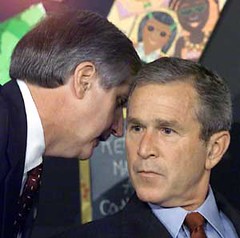 (In a rare moment of levity, snickers broke out in the classroom when CNN played — perhaps for the first time, certainly one of the first times — the now-famous video of Andy Card whispering in President Bush’s ear that a second plane had hit the WTC. Absent sound and thus devoid of context, Bush looks rather silly in that video, sort of like a monkey-faced deer in headlights when he gets the news, and several students laughed out loud when they saw it. Professor Dekmejian initally looked confused — why the heck were people laughing? — but then he turned around and saw Bush’s face on the screen behind him, and immediately gave a look which seemed to say, “Oh, you’re laughing at him. Well, yeah, that makes sense.”)
(In a rare moment of levity, snickers broke out in the classroom when CNN played — perhaps for the first time, certainly one of the first times — the now-famous video of Andy Card whispering in President Bush’s ear that a second plane had hit the WTC. Absent sound and thus devoid of context, Bush looks rather silly in that video, sort of like a monkey-faced deer in headlights when he gets the news, and several students laughed out loud when they saw it. Professor Dekmejian initally looked confused — why the heck were people laughing? — but then he turned around and saw Bush’s face on the screen behind him, and immediately gave a look which seemed to say, “Oh, you’re laughing at him. Well, yeah, that makes sense.”)
As long as we’re talking politics: I remember missing Bill Clinton for a while that day, when President Bush kept making unsatisfying statements (like, as Becky paraphrased it in her phone message, “we’re going to get those folks”) and then disappearing from view. I remember thinking that Karen Hughes’s statement was actually more forceful than the president’s.
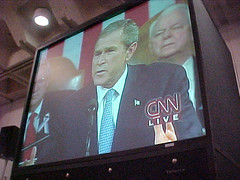 I also remember feeling that Bush redeemed himself with his excellent speech that evening — and again, many times over, with his superb address to Congress nine days later. (“We are not deceived by their pretenses to piety. We have seen their kind before. They are the heirs of all the murderous ideologies of the 20th Century. By sacrificing human life to serve their radical visions — by abandoning every value except the will to power — they follow in the path of fascism, Nazism, and totalitarianism. And they will follow that path all the way to where it ends: in history’s unmarked grave of discarded lies.”)
I also remember feeling that Bush redeemed himself with his excellent speech that evening — and again, many times over, with his superb address to Congress nine days later. (“We are not deceived by their pretenses to piety. We have seen their kind before. They are the heirs of all the murderous ideologies of the 20th Century. By sacrificing human life to serve their radical visions — by abandoning every value except the will to power — they follow in the path of fascism, Nazism, and totalitarianism. And they will follow that path all the way to where it ends: in history’s unmarked grave of discarded lies.”)
Of course, by far the best quote of 9/11 itself came from Tony Blair: “As for those that carried out these attacks, there are no adequate words of condemnation. Their barbarism will stand as their shame for all eternity.” John McCain is a close second, for a statement made on the Senate floor that I recall one of Becky’s friends wrote on his apartment-door whiteboard: “I say to our enemies: We are coming. God may show you mercy. We will not.”
At some point during the day, while en route to or from campus, I stopped at University Village and bought a cheap portable TV at one of the shops there. I felt an urgent need to be connected to the news at all times, so that if something else happened, I wouldn’t be stranded with only the limited information that my primitive cell phone at the time could provide. Relatedly, I also remember that, in the days following 9/11, I subscribed for the first time to CNN and BBC breaking news alerts on my phone, so word of any attack would reach me quickly. And I started religiously reading the online editions of the New York Times and the Washington Post every night before going to bed — the next day’s front-page articles would appear in the early wee hours Pacific Time — to keep up with the news. I’d always been a news junkie, but in the days and weeks after 9/11, being informed became an obsession. Those days were just so momentous.
But back to Tuesday again. (As an aside, go back and read news articles from the days immediately after the attacks sometime, and note the references to “Tuesday’s attacks.” It sounds so strange — we’re all so used to talking about the “9/11 attacks,” but back then, the worst terrorist atrocity in American history had simply happened on “Tuesday.”)
As night fell, the most pronounced local effect of the attacks on L.A.’s everyday life became extremely noticeable: there were no planes in the sky. That fact may not seem terribly significant to those who have never lived in Los Angeles, but see, the L.A. sky doesn’t really have stars. Instead, it has planes. The light pollution is so bad that it’s almost impossible to see anything except airplanes in the night sky — but LAX is so busy that there are virtually always several planes overhead, in any given direction, at any given time. So the absence of planes was downright eerie.
Even more eerie was my experience walking back from Ralph’s supermarket — where I had gone in hopes of finding a copy of the L.A. Times‘s “Extra” edition — late that night, under that strange, blank sky. I felt this overwhelming sense of eerie quiet, like the entire city was hunkered down. And then I had this bizarre, split-second thought that a car turning into my path — well, turning onto the side street that I was about to cross — was perhaps aiming for me. This didn’t make any sense at all, and I immediately shook it off as absurd, but the mere fact that such a thought would even cross my mind was a perfect manifestation of the fear and paranoia that I think we all experienced that day.
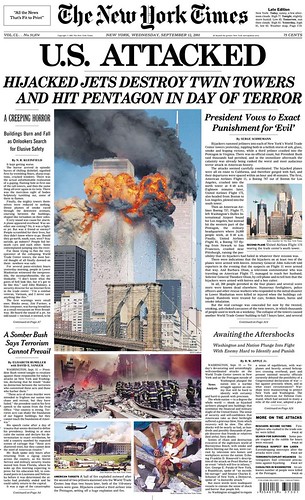 I mentioned earlier that, on 9/11, “for once, I stopped documenting life and simply participated in it.” And that’s largely true. But I didn’t completely stop being myself. I remember expending quite a bit of energy, sometime in the evening, trying to guess what the next day’s New York Times headline would be, even writing out sample possibilities on an old Times that was lying around. But I was way off the mark, because I was thinking of a three- or four-line monster headline — typical of a “regular” huge news story — rather than the one-line, “MAN WALKS ON MOON” font size that’s reserved for once-in-a-generation historic moments. I never thought of anything as simple as “U.S. ATTACKED.”
I mentioned earlier that, on 9/11, “for once, I stopped documenting life and simply participated in it.” And that’s largely true. But I didn’t completely stop being myself. I remember expending quite a bit of energy, sometime in the evening, trying to guess what the next day’s New York Times headline would be, even writing out sample possibilities on an old Times that was lying around. But I was way off the mark, because I was thinking of a three- or four-line monster headline — typical of a “regular” huge news story — rather than the one-line, “MAN WALKS ON MOON” font size that’s reserved for once-in-a-generation historic moments. I never thought of anything as simple as “U.S. ATTACKED.”
The grief of 9/11 also didn’t completely stop me from engaging in snarky media commentary. Having gotten up very early (by my standards) on Tuesday after not quite four hours of sleep, I was nevertheless up quite late Tuesday night, as was Becky. We were almost literally unable to look away from the TV coverage. So it was that, sometime in the wee hours of Wednesday morning, Becky and I and a couple of friends in her apartment building were still watching CNN, long after its first-, second- and third-string anchors and correspondents had all finally gone to bed after a long, grueling, horrible day. We joked, in another “rare moment of levity,” that the people left on the air were a bunch of “interns.” And one of those “interns” seemed to have a rather overactive penchant for symbolism, stating at one point that a particular piece of paper, floating through the air in Lower Manhattan, “says it all.” The American-Beauty-paper-bag-esque absurdity of this statement struck us much funnier than it should have — blowing off some steam amid all the tragedy and heartache, I guess — and we all completely lost it, laughing hysterically at that “intern.”
Needless to say, there was a lot more crying than laughing in the days that followed. But above all, for me, there was this weird sense of numbness. My first post-9/11 class was Constitutional Law on Wednesday the 12th, and I remember that I had a really, really hard time concentrating. The aforementioned Professor Gillman specifically announced at the start of class that he was going to do his lecture as normal, because — as he candidly acknowledged — he really didn’t know how else to process what had happened, or what else to do. It was the Rudy Giuliani approach (everyone get on with your lives, or you’re letting the terrorists win), a few days early.
Meanwhile, an impromptu memorial sprung up at Tommy Trojan, and American flags and patriotic sentiments were everywhere on campus.
I wanted to create some sort of memorial / patriotic tribute myself, so I made a “GOD BLESS AMERICA” sign, and hung it from my apartment’s front porch, along with an American flag that I bought, if memory serves, at the Noticias 32nd Street Market. The resulting display might seem a bit hokey in retrospect, but at the time, it felt almost important to do. Becky, for her part, made a sign that said “PRAY 4 NY” and placed it in her sixth-floor window.
On Friday the 14th, a memorial service was held at Bovard Auditorium. At the end, the assembled masses broke into a semi-spontaneous rendition of “God Bless America,” following the lead of Congress on Tuesday.
That same Friday, President Bush made his famous visit to Ground Zero, when he grabbed the bullhorn and addressed the relief workers — the highlight of his presidency, in retrospect. He was really in his element there, and no other president in my lifetime would have done nearly as well. Anyway, Becky and I were watching live on the little TV that lived on the couch in her tiny apartment. As I recall, the sound quality of the live broadcast was terrible, but the money quote was clearly audible: “I can hear you, the rest of the world hears you, and the people who knocked these buildings down will hear all of us soon!” Becky literally pumped her fist and exclaimed “YEAH!!!” when he said that.
Much later, that sound clip would become part of the climax of what I called my 9/11 anthem, a montage of sound clips set to the Battle Hymn of the Republic:
It took me a good long while for me to even begin to grasp what this all meant, and how different the 9/11 attacks — excuse me, the Tuesday attacks — truly were from, well, everything else, ever. From the very beginning, everyone was saying, of course, that Tuesday had “changed the world,” and words like “war” were being tossed around. But at first, in my head, I was thinking of the attacks as sort of the Oklahoma City Bombing writ large: very different in degree, certainly, but not necessarily different in kind. I figured they would lead to a period of national mourning, and a president “feeling the victims’ pain,” and an effort to bring the direct perpetrators to justice. And that was it. That was all I knew how to conceive of.
Even after the creation of the “Bush Doctrine” on the evening of 9/11 itself, I still didn’t really “get it.” It wasn’t until I saw the front page of Friday morning’s New York Times, headlined “BUSH AND TOP AIDES PROCLAIM POLICY OF ‘ENDING’ STATES THAT BACK TERROR,” that it really sank in. Oh: they were serious about that “war” thing.
And indeed they were. The cliché that 9/11 “changed the world” has proven, of course, to be utterly correct. I titled this post “You Guys, You All Have To Wake Up!” — a quote from Becky’s phone message that terrible morning, but also an apt description of the impact that the atrocity had on the nation’s attitude toward the extremists who had, years earlier, declared war on us. We were unquestionably right to “wake up” to that threat. Whether each specific response to that threat has been correct is a separate question, but I don’t want to start a political debate on this post, in this context. Suffice to say, 9/11/01 was a “defining day” for the world, and I daresay for most of the people in it, one way or another.
On Saturday, September 15, Becky and I drove out to a restaurant in Malibu to get some lunch. We made the drive up the coast in large part because we wanted to “get away,” to put the cares of an awful week behind us and just focus on each other’s company, and a beautiful view of the ocean, for a few hours.
We’re smiling in the pictures above, but in my memory, I associate that otherwise pleasant afternoon with a strange sense of melancholy. We had a nice lunch, but there was no escaping thoughts of what had just happened to the country.
Not even a week had passed since the earth shook while I was studying in Doheny Library, but the seismic events of the intervening days had changed everything. September 11, 2001 was a pivot point in history, the rare sort of day that causes you to almost subconsciously categorize everything into “before” and “after” categories. That’s true of events in the world at large, and it’s true of events in my life, too. Becky’s and my first two cross-country road trips? Pre-9/11. Our third cross-country road trip? Post-9/11. Becky’s sister’s wedding in Germany? Pre-9/11. Our acquisition of our first cat, Toby? Post-9/11. And on and on.
I wish I could have ranked some more pleasant memories, like, say, the USC-Notre Dame game, or the day I fell in love, ahead of September 11, 2001 on this list. But there’s no denying that awful day its rightful place. 9/11 was a “defining day” like no other, and I’ll remember it forever — feeling echoes of that horrible feeling in the pit of my stomach each time I really think about it. (Watching any of the videos, in particular, brings that feeling right back, as if nine years ago were a mere nine minutes.)
As they say: Never forget.
(Photo by yours truly, taken from Staten Island on 9/11/03.)
Defining Days #2 and #1 will be less depressing, I promise! But I make no promises about when they’ll be published. Hopefully sometime this month? This year? This decade? 🙂 I’ve been working on #4 and #3, on and off, for months, but haven’t even started on #2 or #1 yet. So it may be a while.


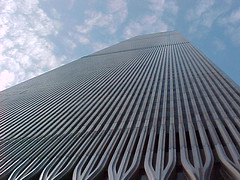
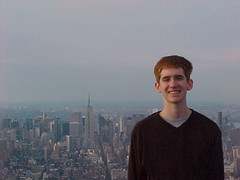
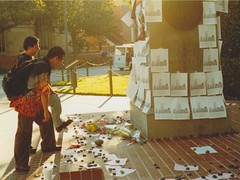
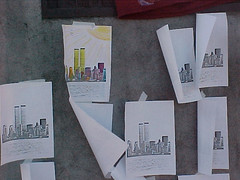
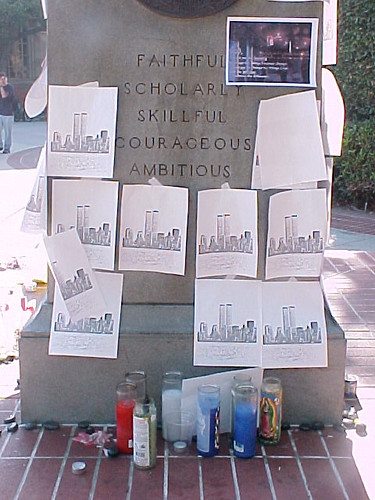
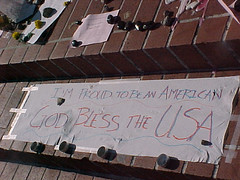
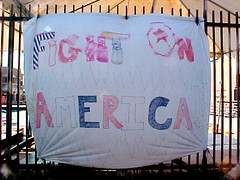
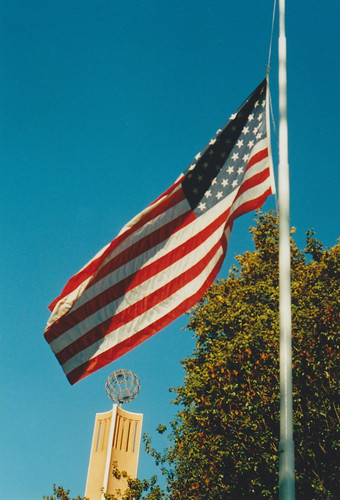
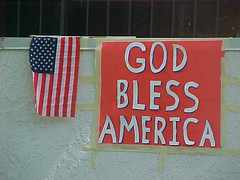
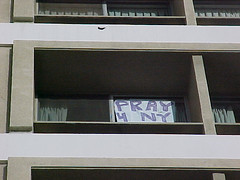
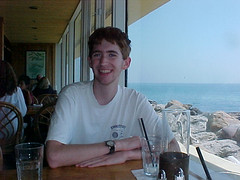
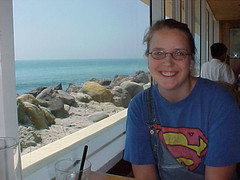
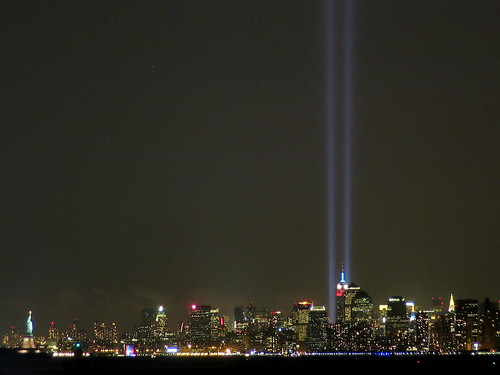
On Saturday, September 15, Becky and I drove out to a restaurant in Malibu to get some lunch.
I’m not totally sure from those pictures, but that looks an awful lot like Chart House, no? Bea and I went there on our way home from our engagement pictures a few years back.
Was thinking about Tea Partiers as I was getting ready this morning, particularly the criticism that meaningful spending reform involves cutting either military spending or entitlements. Entitlements are effectively off the table since a) their recipients vote a lot and b) they aren’t particularly lavish in their current form. Consequently, that means you’re going to see either meaningful cuts to military spending, or huge tax increases.
Cuts to military spending got me thinking about how Obama kept Gates as his Secretary of Defense, following a long Democratic tradition of having a Republican in that role, to offset the perception of Democrats as weak. Indeed, save brief dalliances from Clinton and Johnson, no modern Democratic president has had a Democratic Secretary of Defense save Carter, and look how that worked out in the public’s eye.
Its funny then to consider this topic in light of Bush’s actions on 9/11 and the days and months that followed. The “Card whispering in Bush’s ear” moment is the coda to a window of epic executive irresponsibility that historians will probably compare with Nero fiddling while Rome burned. You heard that a plane hit the WTC and immediately rushed to a tv; Bush heard the same and dismissed it as likely a small prop job, proceeding without further care to head into the infamous school to read “My Pet Goat” to random first graders. There was nothing you could do about the situation; as commander-in-chief there was much that President Nero Bush might have done, were he not more interested in the First Graders’ reading development.
That he ‘redeemed’ himself with later tough talk at the expense of tinhorn terrorists, including two disastrously costly – and ultimately probably counterproductive – wars, tells you everything you need to know about why Democratic Presidents are afraid to have a Democrat as Secretary of Defense.
And everything you need to know about the likelihood of meaningful reform to defense spending.
In summary, if you are a young person still reading this, and you have a family for which you are responsible, you absolutely positively have to get in the habit of living below your means, if you do not do so already. If this nation is still around when it comes time to send your kids to college or fund your retirement, there is no conceivable way that it will exist without vastly higher taxes.
There’s zero political will to have it be otherwise. Entitlements: forget it. To the extent that Bush can redeem his Nero moment with tough talky military stuff, you can forget the military side of the equation too.
(Actually, its funny how you forget some specifics after 9 years…Card’s whispering wasn’t the coda to Bush’s cluster***k, it was more like the midpoint: having been informed that two planes had collided with the WTC, the President continued to stare blankly ahead for a time, listening to the little girl drone on about My Pet Goat. He later rationalized that it was good executive leadership because it projected calm, as if the primary responsibility of senior management was projecting an image. I suppose that beats projecting vomit, which the expression on his face suggested was a real possibility.
This could have led to widespread scorn and condemnation, but he wisely followed up with threats and lots of bombs…surely no future President is going to take the “lots of bombs” option off the table, so there will be no real reform of the American military apparatus).
Jazz, that was one of the most useless, fact-less analyses I have read in quite some time. Epic, even. First, sometime you should go check the statistics over time of military (and intelligence) spending as a % of GDP. If you think there is even a slim chance of denting the long-term fiscal picture by taking a scalpel to the Pentagon, you’ve clearly graduated from the occasional bong to some very powerful shrooms. Second, drawing some sort of deep philosophical meaning from how Dubya reacted to the news of the Twin Towers being attacked is 20/20 hindsight eisegesis of the worst kind. Finally, your citation of Nero fiddling while Rome burned is completely apt, because that metaphor is totally false. Way to go, Jazz — you struck out on just three pitches!
AML, while your breathless ad hominems are entertaining, as always, I simply wish to note that, for the record, the point of #2 and #3 above is that I don’t believe that any meaningful dent can be made in military spending. I particularly enjoyed this ad hominem for the inclusion of the obscure and oddly-inappropriate biblical term (eisegesis, as you surely know, involves misrepresenting the original author’s intent – are you suggesting that Bush was not trying to intimidate the terrorists by staring straight ahead while the little girl read that book? IIRC, he basically admitted as much).
As far as the philosophical implications of Bush’s actions on the morning of 9/11, I wasn’t aware that I had made any; its more of a cut and dried question of what qualifies as effective crisis management. It would seem that, for you, ‘staring straight ahead for an indeterminate period of time’ is an acceptable response by a leader to crisis – I admit I have opinions about that, but in the interest of damping down the ad hominem climate, I’ll keep them to myself.
And if the Nero thing didn’t actually happen – so be it, I really don’t give a shit either way – it really has no bearing on the matter at hand.
Jazz, crisis management is neither limited to nor represented by one’s instantaneous reaction to bizarre and unexpected news, so it is bizarre to me that you would even attempt to draw any meaningful conclusions from that relatively brief circumstance in time. After all, for all we know, FDR went straight to the nearest commode and literally shat a brick and drank his pee when first informed of the Japanese attack on Pearl Harbor, so I’m not sure what the hell any of this has to do with effective crisis management and responding appropriately to an act of war.
And your understanding of eisegesis is a tad off — it is not necessarily “misrepresenting the original author’s intent” (if that can even be truly known), it simply means reading into the text. Explication vs. implication. Deduction vs. induction.
You may also want to brush up on your understanding of what ad hominem means; I am quite capable of leaving you feeling tarred and feathered without any concern to the quality of your character.
Also, whether or not you believe military spending can be “dented”, neither that nor tax hikes nor any other tinkering with discretionary spending can fix the long-term budget prognosis. Entitlement reform is the only path. The fight will be about how to approach entitlement reform, and who will get stuck with the blame for the unsavory bits that need to be done.
I am quite capable of leaving you feeling tarred and feathered
No. You may be capable of feeling like you are one who is tarring and feathering someone like me, but that’s an entirely different topic. When I said I enjoyed your ad hominems (defined as “arguments against a person” – see, for example, “you’ve clearly graduated from the occasional bong to some very powerful shrooms” in #4 above), its because of the pretense that they imply.
One of the delightful paradoxes of this place is the persistence of “bong hit”-type ad hominem slurs dressed up as real arguments, disavowal of same, and then pride at being a….tarrer and featherer?
Funny, but it seems like an earlier version of this blog ventured down this path many years ago, at which time it was clarified that the tolerability of such conduct was relative, that is, it depended on how one was related to the blog. Some things never change.
Jazz, when I said “you’ve clearly graduated from the occasional bong to some very powerful shrooms”, I was merely trying to come up with something slightly more clever than the tired old saying, “You must be smokin’ something.” Apparently I was too clever by half if you somehow took that as a personal attack. Toughen up, dude! Seriously.
AML, I believe it is Geoffrey’s Malibu, not the Chat House.
However, I will ask one question. What the hell does defense spending as % of GDP have to do with anything? GDP has nothing (directly) to do with the Federal budget. And the way we’ve been running things for the past several decades, as in since at least IKE, certainly nothing to do with Government spending. The operative question is what % of Government spending is defense related. In this context GDP is about as useful as knowing what defense spending is in relation to toadstool sales, or sales of Super Mario Cart.
Super Mario Kart, with a K.
The original for the SNES sold over 8 million copies.
The first sequel, Super Mario Kart 64 sold over 11 million copies.
Mario Kart: Double Dash for the Game Cube sold over 7 million.
Mario Kart Wii has been the most succesful selling 21+ million copies!
On the handhelds:
Mario Kart: Super Circuit for the GameBoy Advance sold over 3.75 million
Mario Kart DS sold over 17 million
Pingback: Justin Bieber Keen to Date Rihanna! | Baby Travel Systems
The amount of money wasted on “Defense” is totally insane. We could cut Defense in HALF and remain as safe as we are today, balance the budget and pay for universal healthcare and still have enough left over to give every citizen a check for 10k at the end of every year.
“Justin Bieber Keen to Date Rihanna!”
Never forget.
Sandy:
That was even more insane than your instance that we never went to the moon…..
Insistence, insistence, insistence
must preview before hitting send…..